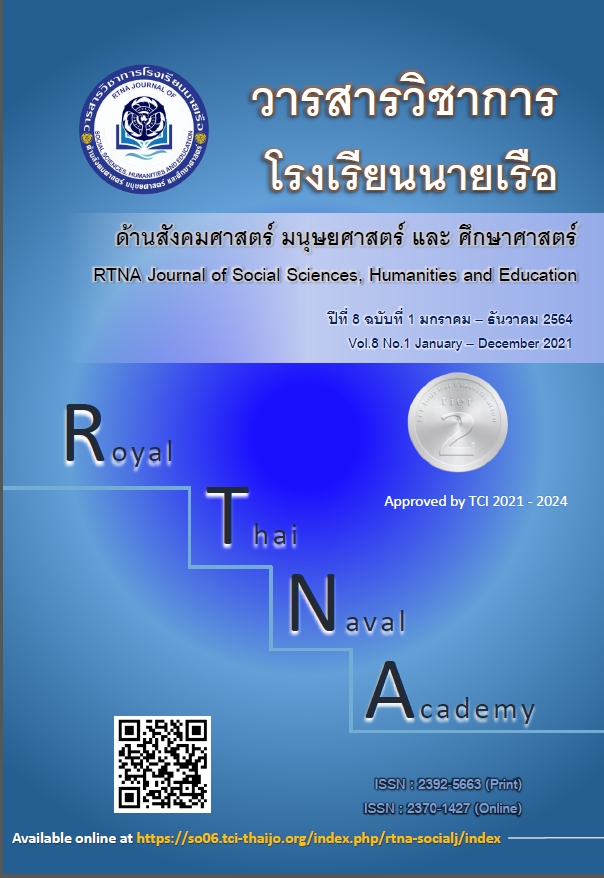How effective the LOSC as “Constitution for the Oceans” deal with maritime issues in Thailand in the case of IUU fishing and human trafficking
Keywords:
Law of the Sea Convention, IUU fishing, human trafficking, Constitution for the OceansAbstract
After the 1982 United Nations Convention on the Law of the Sea Convention (LOSC) came into force in 1994, it has become the primary international maritime law which has been widely utilized by many countries all over the world. Likewise, Thailand has been one country utilizing the LOSC to adopt and revise national laws, particularly fisheries laws and policies. Due to these revised laws, Thailand could deal with IUU fishing more systematically and effectively in the country. By contrast, it seems that the LOSC still has loopholes and insufficient consideration in some areas, such as human trafficking, which has been aroused in Thailand for a long time. Nevertheless, it can be argued that the LOSC as “the constitution for the oceans” has effectively contributed on the improvement of conservation and administration of living resources. One tangible evidence is that Thailand could successfully lift the EU’s yellow card last year.
References
Agreement for the Implementation of the Provisions of the United Nations Convention on the Law of the Sea of 10 December 1982 Relating to the Conservation and Management of Straddling Fish Stocks and Highly Migratory Fish Stocks, August 4, 1995, United Nations, Treaty Series, vol. 2167, p. 3 (entered into force 11 December 2001).
Ahmed, M. (2007). Overfishing in the Gulf of Thailand: policy challenges and bioeconomic analysis. Environment and Development Economics, 12(1), 145. doi:10.1017/S1355770X06003433
Anti-Human Trafficking Act B.E.2551./(2008, 6 Febuary)./Ratchakitcha./125/29 A/28-49./Retrieved May 29, 2020, from/(http://www.ratchakitcha.soc.go.th/DATA/PDF/2551/A/029/28.PDF)
Birnie, P., Boyle, A., & Redgwell, C. (2009). International Law & the Environment. Oxford: Oxford University Press.
European Commission (2015, 21 April). EU acts on illegal fishing: Yellow card issued to Thailand while South Korea & Philippines are cleared. European Commission. Retrieved June 1, 2020, from https://ec.europa.eu/commission/presscorner/detail/%20en/IP_15_4806
Food and Agriculture Organization of the United Nations. (2020). Illegal, Unreported and Unregulated (IUU) fishing : What is IUU fishing?. Retrieved May 30, 2020, from http://www.fao.org/iuu-fishing/%20background/%20what-is-iuu-fishing/en/
Indian Ocean Tuna Commission. (2020). Indian Ocean Tuna Commission, Food and Agricultural Organization of the United Nations. Retrieved May 30, 2020, from https://iotc.org/
Indian Ocean Tuna Commission. (2020). Resolution 01/07 Concerning the support of the IPOA-IUU Plan. Retrieved May 30, 2020, from https://www.iotc.org/cmm/resolution-0107-concerning-support-ipoa-iuu-plan
Khemakorn, P. (2015). Fishing Capacity Management for Sustainable Fisheries in Thailand. (Doctor of Philosophy (PhD) thesis). Wollongong: University of Wollongong.
Macfarlane, D. (2015). The Slave Trade and the Right of Visit Under the Law of the Sea Convention: Exploitation in the Fishing Industry in New Zealand and Thailand. Asian Journal of International Law, 7(1), 94. doi:10.1017/S2044251315000235
Marine Knowledge Management Subcommittee. Maritime Zone. (2020). Marine Knowledge Hub. Retrieved May 30, 2020, from http://www.mkh.in.th/
Ministry of Foreign Affairs of Thailand (2018, 24 September). Significant Strides Made in Thailand’s Battle against IUU Fishing. CISION PR Newswire. Retrieved June 1, 2020, from https://www.prnewswire.co.uk/news releases/significant-strides-made-in-thailands-battle-against-iuu-fishing-694112361.html
Oceans and Law of the Sea United Nations. Division for Ocean Affair and the Law of the Sea. (2020). United Nations Convention on the Law of the Sea of 10 December 1982 Overview and full text, The Convention, history background, A Constitution for the Oceans Remarks by Tommy T.B. Koh, of Singapore, President of the Third United Nations Conference on the Law of the Sea. Retrieved May 28, 2020, from https://www.un.org/depts/los/convention_agreements/convention_overview_convention.htm
Rothwell, D.R., & Stephens, T. (2010). The International Law of the Sea. London: Hart Publishing.
Thai fisheries Act B.E.2490./(2490, 14 January)./Ratchakitcha./64/3./81-114.Retrieved May 29, 2020, from/(http://www.ratchakitcha.soc.go.th/DATA/PDF/2490/A/003/81.PDF)
Thai Vessel Act B.E.2481./(2481, 10 April)./Ratchakitcha./56/230-271.Retrieved May 29, 2020, from/(http://www.ratchakitcha.soc.go.th/DATA/PDF/2482/A/230.PDF)
The Immigration Act of B.E.2522./(1979, 1 March)./Ratchakitcha./96/28/45-92.Retrieved May 27, 2020, from/(http://www.ratchakitcha.soc.go.th/DATA/PDF/2522/A/028/45.PDF)
The Royal Ordinance on Fisheries B.E.2558./(2015, 13 November)./Ratchakitcha./132/108 A/1-45.Retrieved May 20, 2020, from/(http://www.ratchakitcha.soc.go.th/DATA/PDF/2558/A/108/1.PDF)
United Nations Convention on the Law of the Sea 1982 (LOSC), December 10, 1982, 1833 UNTS 397 (entered into force 16 November 1994) UN Treaties.
United Nations Office on Drugs and Crime (UNODC) Regional Office for Southeast Asia and the Pacific. (2019). Criminalisation of Smuggling of Migrants in ASEAN Member States. Bangkok: United Nations Office on Drugs and Crime (UNODC).
United Nations. (2020). United Nations Convention on the Law of the Sea of 10 December 1982 Overview and full text. Ocean and the Law of the Sea United Nations. Retrieved May 20, 2020, from https://bit.ly/3wuWFML
United Nations. United Nations Convention on the Law of the Sea Montego Bay,
December 1982 status as at: 25-05-2020. Retrieved May 25, 2020, from https://bit.ly/2TQDsaZ
Zacharias, M. (2014). Marine policy: an introduction to governance and international law of the oceans. London: London Earthscan from Routledge.
Downloads
Published
Issue
Section
License
The author has the sole responsibility for the material published in RTNA Journal of Social Sciences, Humanities, and Education, which the editorial team may not agree on that material.
RTNA Journal of Social Sciences, Humanities, and Education owns the copyright of the text, the illustration, or other material published in the journal. No parts or the whole of the material published may be disseminated or used in any form without first obtaining written permission from the academy.






